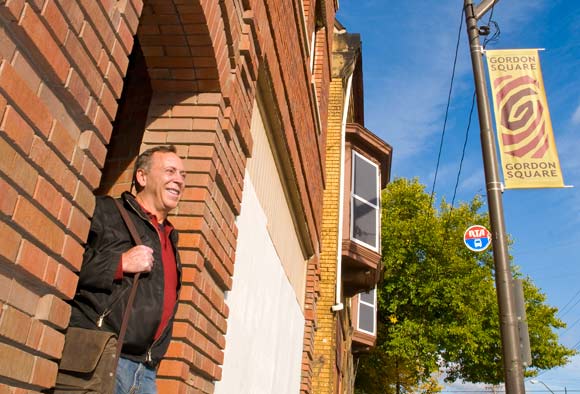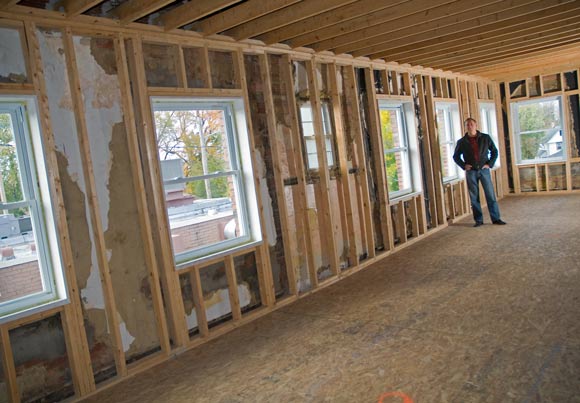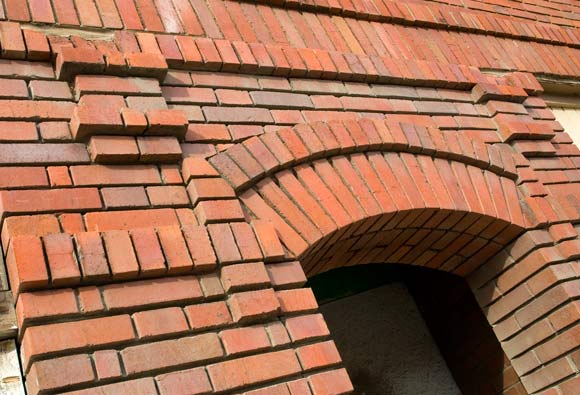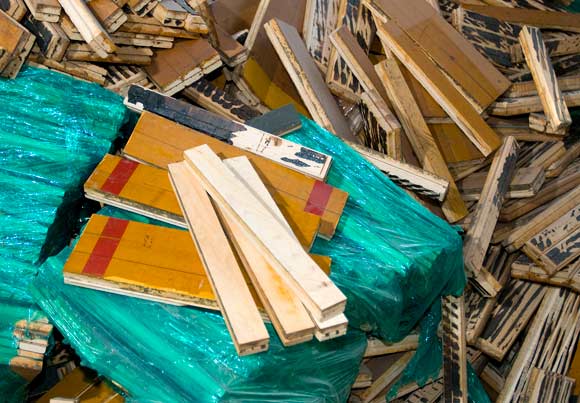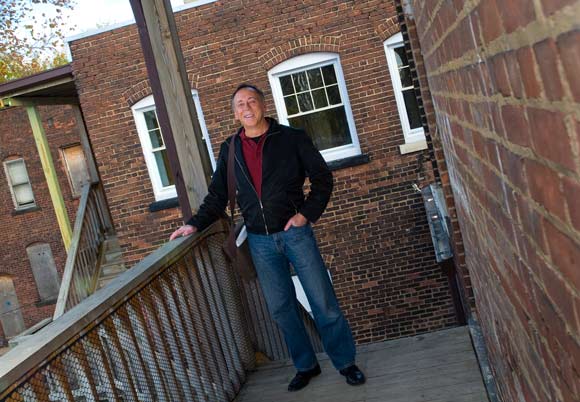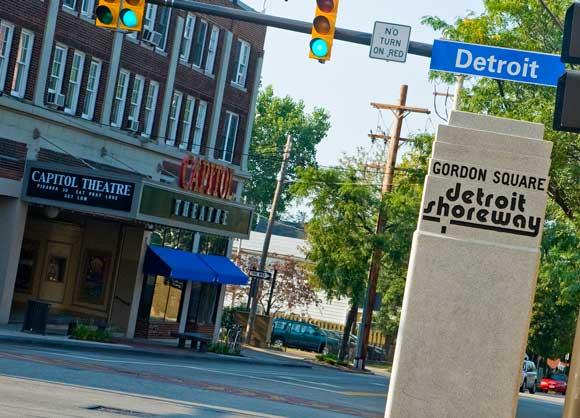landmark detroit shoreway building gets second chance thanks to keen developer
When it comes to real estate, Howard Grandon believes in second chances. That's why he's transforming a former illicit nightclub on Detroit Avenue into market-rate apartments and storefronts, which he hopes will continue to breathe new life into an old neighborhood.
"I enjoy the creative aspect of taking something that's old and forgotten and rejuvenating it," Grandon explains. "We don't need to throw our older buildings away -- things can be better the second time around."
Grandon and business partner Howard Rosekelly are renovating the former "Cheerios" building at 7312 Detroit into four market-rate second floor apartments and five additional first floor storefronts. The building takes its unofficial moniker from a nightclub of the same name that occupied the property. Until the team purchased the building, it sat vacant for seven years, all the while collecting trash. Once renovated, it will feature loft-style apartments that Grandson hopes will appeal to young professionals, artists and other individuals who want to live in the budding Gordon Square Arts District.
"We really like the area," says Grandon. "We're close to the arts district, Edgewater Park and Lake Erie, so we believe this is a great location."
Gordon Square, located in the Detroit Shoreway neighborhood, continues to attract new residents, businesses and buzz. The centerpieces of the rejuvenated area include the refurbished Capitol Theatre, an indie movie house, and the fringy Cleveland Public Theatre, which produces avant-garde plays. A sparkling new Detroit Avenue streetscape, filled with public art, broad sidewalks and street-side landscaping, was completed just over a year ago.
Grandon's investment is part of a redevelopment trend in the area. According to Ian Andrews, Director of Development for the Detroit Shoreway Community Development Organization (DSCDO), 33 new businesses have opened in the neighborhood since 2006. These include restaurants such as Luxe Kitchen and Lounge, Stone Mad, and the rebranded Happy Dog, and specialty retail like duoHome.
"We're excited about this project because it shows that private investors are interested in our neighborhood," says Andrews. "The Gordon Square Arts District is helping to attract people to live in the city."
A 2009 study by the nonprofit group Team NEO estimated that $30 million in public and philanthropic dollars will been invested into the Gordon Square Arts District to complete the theater projects, streetscape, and parking changes. The study also estimated that this investment will leverage $371 million in private investment by 2013.
Grandon's project almost didn't happen. After weaving his way through Cleveland's labyrinthine approvals process earlier this year, he faced dim prospects for getting a loan.
"We went to talk to lenders, and the first thing they told us was, 'Okay, we need to see cash receipts for the past three years,'" says Grandon. "They didn't get that we were redeveloping a vacant building."
Then Grandon approached Cleveland Action to Support Housing (CASH), a nonprofit that helps catalyze the rehab of residential properties in Cleveland by offering special low interest loans and technical assistance. Working with CASH, Grandon and his partners were able to obtain financing and finally break ground. DSCDO also helped push the project forward, and the City of Cleveland's Storefront Renovation Program will provide a rebate on exterior building improvements. All told, the developers were able to finance eighty percent of the costs.
The redevelopment of the Gordon Square Arts District, if not exactly a citywide trend, demonstrates to CASH Director Marcia Nolan and others that big projects can indeed happen in Cleveland, given sufficient political will, public and nonprofit support, and the right market niche.
"Howard Grandon goes to show that investment is happening in Cleveland," says Nolan. "We need to build on local success stories."
When completed, Grandon's roomy one-bedroom units, which average 800 square feet and go for $750 to $850 per month, will feature large windows, open floor plans and new mechanical systems. Two units have access to a roof patio. Each has dedicated off-street parking and shares a cozy backyard garden. Once the apartments are complete, Grandon and his partners will move onto the first floor retail spaces and exterior.
The buildings also boast energy-efficient and sustainable features, including high-efficiency insulation in each of the apartments, reuse of brick from a dismantled patio, and drought-resistant landscaping. Some units will feature hardwood flooring that was salvaged from an old gym. All told, Grandon says he'll spend about $500,000 on the project.
While the developers haven't yet begun renovating the storefronts, Grandon envisions boutique-style shops such as a men's clothing store or florist that will serve the neighborhood and attract visitors to the area. "This is about creating what it takes to sustain a neighborhood," he says.
The renovation is a side gig for Grandon, who works for Progressive Insurance. Grandon has completed six other projects prior to rescuing the Cheerios building.
"At 9,000 square feet, the building was larger than what we'd originally been looking for," he admits. "But we fell in love with the Gordon Square area."
Like what you see? Subscribe to receive Fresh Water, Cleveland's fresh new e-zine, delivered weekly to your inbox.


